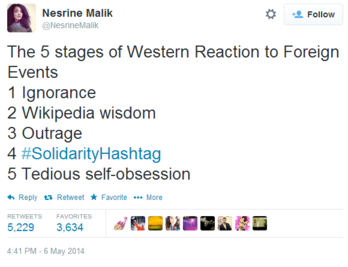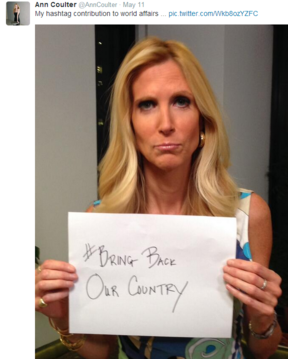A post began circulating on social media last week:
The post was spurred by the reaction in the United States to the kidnapping of more than 200 girls from their school in Nigeria by Boko Haram. Boko Haram was not a familiar name in many U.S. circles, and the outrage at the kidnapping was slow to build. However, with the help of a small group of intrepid reporters, the West did take notice. #BringBackOurGirls has become the hashtag heard round the world, earning millions of retweets, and gaining attention from many prominent figures, including First Lady Michelle Obama.
While foreign policy is not dictated by hashtags, some have hypothesized that the global attention produced by the kidnappings may have helped drive more action by international partners, particularly the United States. That attention may just save those girls' lives.
So why is that a bad thing? While our Twitter culture may be mocked by some, it is undeniable in its power. Nearly every day, calls go out to help find lost loved ones, or dangerous criminals who are still at large. Advocacy groups have learned how to turn sophisticated social media campaigns into drivers of philanthropic and political success.
Ellen DeGeneres has 28.9 million followers. When was the last time you were able to get a message in front of 28.9 million people without paid advertising?
And yet, quite often the strategy to create an engaging hashtag campaign can backfire.
More often than not when trending hashtags are hijacked, it is done by Twitter accounts promoting items for sale (largely unrelated to the campaign). Sometimes, the hashtag is taken over by those who disagree with the campaign's message. As the New York Police Department (NYPD) quickly learned last month, sometimes the hashtag #FAIL is self-inflicted.
In a move presumably meant to positively engage New Yorkers via social media, the NYPD's Twitter account invited followers to tweet and tag photos featuring officers with #myNYPD. What ensued, however, were mountains of photos containing images of alleged police brutality and miscellaneous police wrongdoing.
While the communications staffer who came up with the idea may have been wondering what happened to his well-intentioned campaign, New York Police Commissioner Bill Bratton responded as best he could, with humility. "I kind of welcome the attention," he told the New York Daily News. "We really broke the numbers yesterday."
Commissioner Bratton was right. While I do not subscribe to the "all press is good press" mantra, all you can do if your hashtag is hijacked is try to make lemons out of lemonade. Sometimes even if your campaign is hijacked, the use of the hashtag succeeds in raising awareness (and Twitter numbers). But account managers would be wise to think through potential pitfalls before launching a hashtag campaign. How might the hashtag be manipulated? Are there messages in the queue that can help steer the message back to its original purpose? Are enough stakeholders engaged in the campaign to help ensure that the focus stays on the campaign itself?
Which brings us back to #BringBackOurGirls. This weekend, conservative commentator Ann Coulter decided to hijack the hashtag:
While her photo has been retweeted more than 2,000 times, the responses back continue to multiply. Though the messages Photoshopped into her post may touch on the inappropriate, so was her attempt to hijack a hashtag that has gained millions of messages of support. Although I doubt Ms. Coulter cares very much about the reaction to her attempted hijacking, the swift response does demonstrate how social media can reject a hashtag hijacker.
Whether her actions were designed to minimize the importance of the tragedy playing out in Nigeria, or to poke fun at an administration that has demonstrated time and again the power of social media, it turns out the #FAIL proved to be hers.


